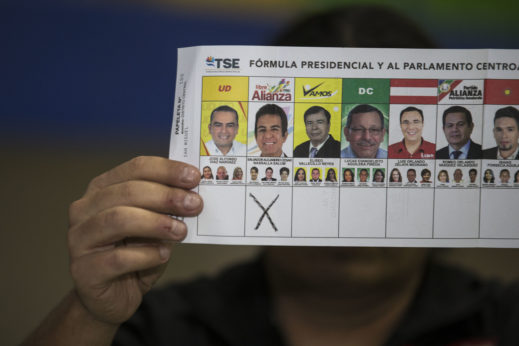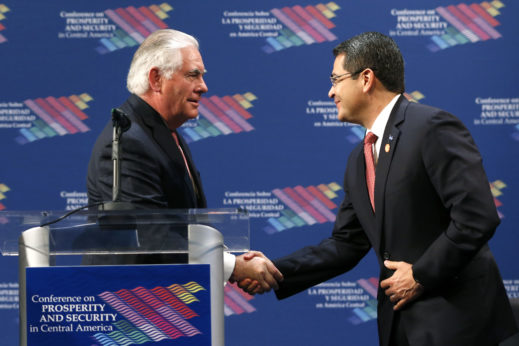
Although Honduras’ incumbent right-wing president, Juan Orlando Hernández, went into Sunday’s vote certain of re-election, it now seems that such confidence may have been misplaced. Unless his ruling National Party comes up with a scheme to rig the results during ballot counting—which it may very well be attempting to do—it looks like the unity candidate of the left-center opposition forces, Salvador Nasralla, will take the presidency.
Heading into the vote, pollsters claimed that Hernández, who billed himself as the crime-fighting president, would win by a comfortable margin. However, the results announced by election officials early Monday morning showed something completely different.
With 57 percent of the ballots counted on a very high turnout, Nasralla had captured 45.17 percent of the vote, Hernández 40.21 percent, and Orlanda Zelaya of the Liberal Party (no relation to former Honduran president Manuel Zelaya) 13.77 percent.
None of the other candidates garnered even one percent apiece. In Honduras, a plurality of the vote elects the president, and there is no run-off election if no one gets a majority. So after the initial tally, things were looking very good for Nasralla.
This was in spite of widespread reports of irregularities in the voting procedures and revelations of a pre-election plot to rig the count. It was an election the opposition fully expected to be stolen. And although the early numbers look good for Nasralla, there are fears that election theft may be exactly what the ruling party is attempting to do now.
Since the announcement of that first 57 percent of ballots, the publication of results has stopped. The head of Hernández’s National Party, Reinaldo Sánchez, claimed that when the votes not yet counted come in, Hernández will be shown to have won. Nasralla has announced his own victory, however, and the Liberals’ Zelaya conceded to him and urged Hernández to do likewise.
As of press time, Hernández has refused to do that. No good explanation for the delay in the announcement of results has been given by election authorities, which is arousing suspicion that skullduggery is afoot. If the National Party is trying to cook the electoral books, it would not be the first time in recent history that democracy has been subverted in this country.
Democracy subverted
The historical context for what is now unfolding could not be more dramatic. In June of 2009, Honduras’ military, acting in coordination with right-wing politicians of the National and Liberal Parties, overthrew the legally elected president, Manuel “Mel” Zelaya, and tried to send him into exile. At the time, United States officials worked with right-wing politicians in Latin America to consolidate the coup and try to prevent Zelaya from returning to power. The pretext for overthrowing him was the claim that he had planned to run for re-election in defiance of the national constitution.

The real reason for the coup was the fact that Zelaya, who was himself originally from the Liberal Party, had carried out moderate reforms, including improvements in the rights of workers and small farmers, which were seen as threating to the interests of powerful oligarchs. There was also worry over Zelaya’s insistence on maintaining friendly relations with Cuba and Venezuela. Finally, Zelaya had supported the idea of a Constituent Assembly to rewrite Honduras’ constitution and laws. For the right wing and U.S. imperialism, this sounded too much like what was going on in Venezuela under Hugo Chávez.
Zelaya made a dramatic return to Honduras from his forced exile and for a while was besieged in the Brazilian embassy in the capital, Tegucigalpa. He is now a member of the country’s Congress.
Zelaya was replaced by right-wing businessman Roberto Micheletti. The pro-Zelaya, left-of-center parties boycotted the subsequent 2009 election, which was won by Porfirio Lobo, the candidate of the right-wing National Party. Lobo left office in 2013, and was replaced amid accusations of electoral fraud by the current president, Hernández.
From the coup against Zelaya onward, the level of violence in Honduran society grew in proportion to the level of corruption among the country’s ruling politicians. Women, LGBTQ activists, indigenous and Afro-descendent people, journalists, and opposition activists were murdered by the score. Small farmers challenging the power of big landowners, such as the late Miguel Facusse in the Lower Aguan Valley, were gunned down.
In March 2016, in a particularly high profile case, Berta Caceres, a leader of the Lenca indigenous people and organizer of protests against intrusive hydroelectric dams in her people’s territory, was shot dead in her mother’s home. As Caceres was internationally known in environmentalist circles, this caused worldwide indignation, but she was not the first nor the last of such social activists to be murdered. Many thousands of ordinary Hondurans have fled the country to seek refuge in the United States, including a large number of minor children.
In Washington, there was much wringing of hands and efforts in Congress to cut off security aid to the Honduran government, but the Trump administration now continues the support that the Obama administration provided the Honduran security services, in spite of accusations of human rights abuses by militarized police.
Hernández: The candidate of transnational capital
The most powerful sectors of transnational monopoly capital took full advantage of the overthrow of Zelaya. The governments that followed after him threw the country open to the most abusive practices of extractive and other transnational industries, changing the country’s laws to weaken unions and other people’s organizations that might stand in the way of such plundering. Repressive measures have included the criminalization of social protest.
Yet Hernández campaigned during this election on the claim that he had improved the security situation of Honduras, basing himself on crime statistics that many doubt. Honduras is a major player in the transmission belt which carries narcotics from South America, up through Central America and Mexico, into the United States.
The administrations of all three post-coup presidents—Micheletti, Lobo, and Hernández—have been accused of either turning a blind eye to drug dealing, or being actually tied to it. Lobo’s son, Fabio Lobo, has been sentenced to prison in the U.S. for his involvement, and his father is also implicated. In the case of Hernández, lower-level drug dealers, facing prosecution in the U.S, have implicated both his brother and his security chief for cooperation with “Los Cachiros,” Honduras’s biggest drug trafficking outfit.
Hernández’s government has also faced accusations of massive corruption, including the divergence of a large amount of money from the Social Security Institute to the coffers of his National Party. The SSI provides health care to the poor. Hernández claimed he knew nothing about this, even though the fixer in the case was his own sister. This scam cost lives.
The 1992 Constitution of Honduras forbids the re-election of the president, an act which Manuel Zelaya was supposedly planning according to the coup plotters in 2009. However, the resourceful Hernández has not let himself be deterred by such details. After packing the Supreme Court with his supporters, Hernández got the court to rule that this constitutional prohibition was—unconstitutional.
The opposition, especially supporters of ex-president Zelaya’s left-wing LIBRE Party, denounced the move as itself a constitutional violation, but Hernández went ahead anyway.
United against the right
The LIBRE (Liberation and Refoundation) party formed a coalition for the presidential election this time with the centrist Innovation and Unity Party, PINU. Their coalition, called the Opposition Alliance Against the Dictatorship, chose as its candidate Nasralla, a centrist figure known from the world of television and sports.

Nasralla had been the candidate of the Anti-Corruption Party in the 2013 elections, but he, LIBRE, and PINU decided that the priority this year was to prevent Hernández and the National Party from consolidating a right-wing dictatorship in the country. Nasralla campaigned on a program of promoting social justice and ending corruption.
The Liberal Party, to which Manuel Zelaya had originally belonged, nominated Luis Orlando Zelaya (again, no relation), as mentioned above. The field of presidential candidates included six other people, including General Romeo Vázquez Velásquez, author of the 2009 coup.
In addition to electing a new president, Hondurans also voted for three vice presidents, all 128 seats in the National Congress, some 300 local offices, and representatives to PARLACEN, the Central American Parliament. At writing, there were insufficient results to give a clear picture of what happened in the legislative, local, and PARLACEN elections. Berta Caceres’ daughter, Olivia Zuñiga Caceres, however, was a LIBRE candidate in a district in the Lenca heartland.
At any rate, if the statistics giving Nasralla the presidency hold up, it will be a major victory for the progressive forces not only in Honduras but in Central America and the whole region. It remains to be seen how the Honduran oligarchy and military, the regional political right, and the Trump administration will react to such a historic development.
For now, the wait continues for the other 43 percent of ballots.












Comments